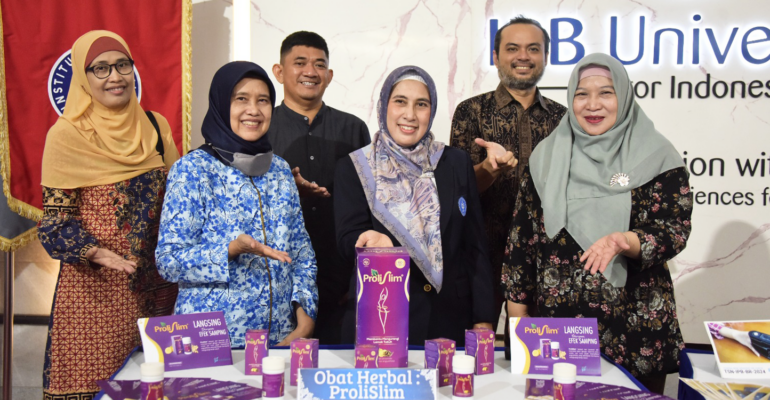IPB University Researchers Develop Herbal Slimming Products from Indonesian Medicinal Plants ‘Asam Gelugur’ and ‘Kunci Pepet’

Overweight and obesity is one of the most serious problems caused by excessive fat accumulation in the body tissues. Obesity can also cause a series of diseases associated with obesity such as Pickwickian syndrome.
Not only that, obesity is also linked to various other diseases such as hypertension, hyperlipidaemia, cancer, diabetes, and cardiovascular disease. Even from the results of research during the COVID-19 pandemic, obesity is a factor that causes a high risk of death from the virus.
Researchers from IPB University’s Biopharmaca Study Centre (Trop BRC) and also IPB University lecturers from the Department of Chemistry, Faculty of Mathematics and Natural Sciences (FMIPA), Prof Dyah Iswantini and her team found an herbal medicine that is claimed to help reduce body fat based on ‘asam gelugur,’ and ‘kunci pepet’, which are native Indonesian plants.
The slimming herbal medicine that has been produced by PT Indofarma Tbk under the brand name Prolislim has gone through a series of bioprospection research of medicinal plants that are efficacious as antiobesity or slimming. The research was funded by the Education Fund Management Agency (LPDP) of the Ministry of Finance of the Republic of Indonesia.
“Tests on the efficacy of single extracts and combined extract formulas in vitro and in vivo show that the slimming formula based on ‘kunci pepet’ and ‘asam gelugur’ can reduce the body weight of experimental animals by 11,22 per cent for 12 days,” said Prof Dyah during the Health Innovation Launching event (23/8) at IPB Dramaga Campus.
Furthermore, to increase the level from traditional medicine (OT) to Standardised Herbal Medicine (OHT), in vivo tests were carried out based on protocols that had received Preclinical Test Implementation Approval (PPUPK) from the Food and Drug Monitoring Agency (BPOM). The results of the preclinical formula efficacy test showed that the administration of ‘asam gelugur’ and ‘kunci pepet’ preparations could affect the metabolism of experimental animals, preventing excessive fat storage due to high-fat feeding, resulting in body weight gain close to the normal group given standard feed. The acute toxicity test shows that the preparation formula is in the non-toxic category.
Traditionally, ‘kunci pepet’ (Kaempferia angustifolia) has been used by the community to prevent and treat cancer, overcome stomach pain, dysentery, diarrhoea, and colds. Not only that, it is believed to slim the body, be used as a cosmetic, and increase stamina for women after childbirth (postpartum period).
“From the results of this study, we found that the compound Flavokawain A isolated from the ‘kunci pepet’ rhizome showed inhibition of fat tissue formation in 3T3-L1 adipocyte cells. Flavokawaian A compound was submitted and approved by BPOM as a characterising compound/active ingredient for antiobesity,” she explained.
While ‘asam gelugur’ (Garcinia atroviridis), is a tropical plant that grows alone in tropical forests. This plant grows in North Sumatra and Aceh and has been used by the community as a cooking spice. The calcium hydroxycitrate (HCA) content in gelugur tamarind can be used to treat obesity.
Prof Dyah revealed that the results of this research were strengthened by the results of market tests I and II by PT Indofarma Tbk. After one month of testing, the results showed a decrease in waist circumference in female respondents. Meanwhile, blood tests did not have a significant effect on female respondents in several matters such as creatinine, ureum, glucose, upper and lower tension.
The results of this anti-obesity research were honoured by the Ministry of Research and Technology, RI in collaboration with BIC as one of the ‘103 Most Prospective Innovations of Indonesia’ in 2011. In addition, to protect the inventor’s intellectual property rights, the inventor successfully obtained a patent award (granted) dated 4 June 2018 with the number IDP000051408.
This research activity has obtained a standardised laboratory-scale and product-scale extraction method of ‘kunci pepet’ and ‘asam gelugur’. The results of CoA analysis of raw materials and slimming OHT candidate products gave qualified results and were within the permissible threshold limits.
Genetic modification of ‘kunci pepet’ plant tissue culture produced callus containing biomarker compounds higher than plants that were not fertilised. This has the potential to be developed into an alternative source of raw materials from ‘kunci pepet’ plants.
Collaboration with PT Indofarma Tbk to complete the missing data as a requirement for OHT Prolislim registration. Research activities continue with funding from the 2024 matching fund programme (PDP) chaired by Prof Dyah Iswantini, involving a number of IPB University lecturers and students. This product is the result of research funded from Rispro LPDP commercial for 2 years and Rispro LPDP invitation for 3 years (*/Rz) (IAAS/RUM)



